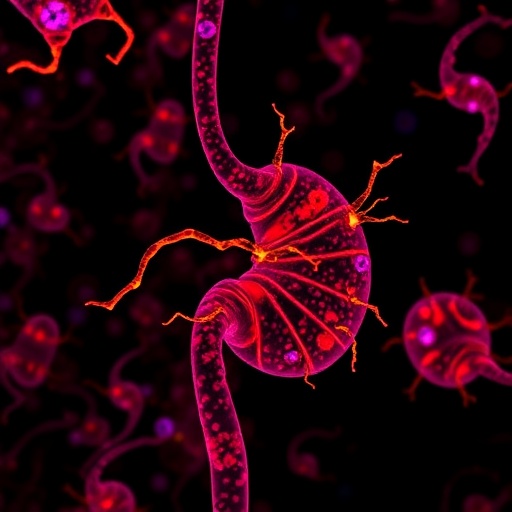Pancreatic cancer continues to challenge oncologists with its aggressive nature, late diagnosis, and stubborn resistance to established treatments. While many malignancies have seen significant progress through immunotherapies, pancreatic tumors frequently evade immune detection and destruction. A groundbreaking study from Northwestern Medicine is shedding light on a unique biochemical cloak that pancreatic cancer cells employ to mask themselves from immune surveillance. This discovery not only enriches the current understanding of tumor immune evasion but also paves the way for a novel targeted therapeutic approach that re-engages the body’s own immune defenses.
At the heart of this elusive mechanism lies a sugar molecule known as sialic acid. Under physiological conditions, normal cells decorate their surfaces with sialic acid residues to convey a protective “don’t attack” message to immune cells. This molecular signal ensures immune tolerance and prevents unwarranted inflammation or autoimmunity. However, the Northwestern team found that pancreatic cancer cells exploit this natural safety feature by amplifying sialic acid presentation on a key surface protein, integrin α3β1. This glycosylation event transforms the integrin into a deceptive agent that binds immune inhibitory receptors, effectively sending a “stand down” message to immune cells.
This false signaling is mediated by a receptor expressed on immune cells called Siglec-10, a member of the sialic acid-binding immunoglobulin-like lectins family. When Siglec-10 interacts with the aberrantly glycosylated α3β1 integrin, it suppresses macrophage activation and effector functions, including phagocytosis—the process by which immune cells engulf and destroy cancer cells. The tumor’s sugar-coated disguise thereby subverts the immune system’s surveillance, allowing malignant cells to thrive undetected and unchallenged within the host.
To counter this sophisticated immune evasion strategy, the Northwestern scientists engineered monoclonal antibodies specifically designed to block the interaction between Siglec-10 and the sialylated integrin α3β1. These antibodies effectively interrupt the suppressive glyco-signaling axis, liberating macrophages from the inhibitory brakes imposed by the tumor’s sugar coat. Laboratory experiments with cultured cells demonstrated a marked reactivation of macrophage phagocytic function once the antibody was applied, promoting the clearance of pancreatic cancer cells.
The preclinical evidence was strengthened by in vivo studies utilizing two distinct mouse models of pancreatic cancer. Treatment with the anti-Siglec-10/α3β1 integrin antibodies significantly slowed tumor progression and enhanced immune cell infiltration within the tumor microenvironment. These findings highlight not only the therapeutic potential of targeting glyco-immune checkpoints but also the crucial role of tumor glycosylation patterns in shaping immune responses.
The path to developing these antibody therapies was complex and lengthy. The team screened thousands of hybridoma cell lines to isolate monoclonal antibodies with the specificity and affinity necessary to disrupt the Siglec-10 and integrin binding. It took roughly six years of painstaking work to identify lead candidates capable of blocking the tumor’s sugar-based stealth mechanism without disrupting normal cellular functions, underscoring the challenges inherent in translating sophisticated molecular insights into viable therapeutics.
Looking ahead, the research team plans to optimize these antibody candidates for compatibility with human immune systems and conduct early-phase clinical trials focused on safety and dosing. Additionally, synergistic combinations with conventional chemotherapy and existing immunotherapies are under investigation, with the aim of achieving not just tumor growth suppression but complete remission. By targeting this unique glyco-immune checkpoint, the researchers hope to break through the current barriers that have stymied effective treatment of pancreatic cancer.
Another critical focus of ongoing work includes the development of companion diagnostics. These tests will identify patients whose tumors prominently utilize the sialic acid–Siglec-10 pathway for immune evasion, enabling personalized treatment strategies that maximize therapeutic efficacy. Such precision medicine approaches are increasingly viewed as essential for overcoming cancer heterogeneity and improving patient outcomes.
Beyond pancreatic cancer, this study opens the door to investigating whether similar sugar-mediated immune evasion tactics are employed by other recalcitrant cancers, including glioblastoma and certain forms of ovarian and lung cancer. Moreover, these insights into glyco-immunology may have ramifications for treating chronic infectious diseases and autoimmune disorders, where immune regulation is likewise critical.
The research led by Associate Professor Mohamed Abdel-Mohsen at Northwestern University Feinberg School of Medicine exemplifies cutting-edge glyco-immunology, an emerging field that interrogates the intersection of carbohydrate chemistry and immune signaling. By leveraging detailed molecular understanding of sugar-protein interactions and their immunomodulatory effects, scientists are translating fundamental discoveries into transformative therapies designed to subvert cancer’s most cunning defenses.
As pancreatic cancer awareness intensifies during its dedicated awareness month, this innovative work offers tangible hope for patients facing one of the deadliest diseases worldwide. The five-year survival rate stagnates at approximately 13%, largely due to the tumor’s ability to evade immune destruction. The breakthrough investigation into the sugar-coat camouflage and its disruption heralds a promising new direction for immunotherapy against pancreatic cancer. While clinical translation will require several more years, this pioneering approach exemplifies the power of scientific perseverance, multidisciplinary collaboration, and molecular ingenuity to turn the tide against formidable cancers.
Subject of Research: Pancreatic cancer immune evasion via sialic acid–mediated glycosylation and integrin–Siglec-10 interactions
Article Title: Targeting Interactions Between Siglec-10 and α3β1 Integrin Enhances Macrophage-Mediated Phagocytosis of Pancreatic Cancer
News Publication Date: November 3, 2025
Web References:
Cancer Research DOI: 10.1158/0008-5472.CAN-25-0977
Image Credits: Northwestern University
Keywords: Pancreatic cancer, glycoproteins, monoclonal antibodies, immunotherapy, cancer immunotherapy
Tags: antibody therapy for cancerenhancing immune responseglycosylation and immune signalingImmune Evasion Mechanismsimmune tolerance in cancerintegrin α3β1 role in tumorsNorthwestern Medicine cancer researchnovel cancer treatment strategiesovercoming cancer resistancepancreatic cancer immunotherapysialic acid in cancer cellstargeted therapeutic approaches





